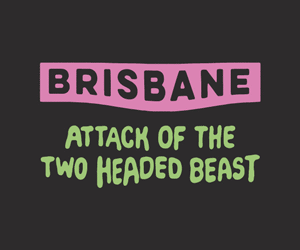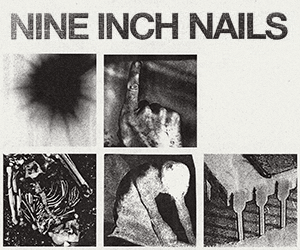Aussie-born and LA-based singer/songwriter Dolly Dagger (named after the Hendrix song, natch) is reanimating a …
Karina Utomo, lead vocalist of Melbourne metal band High Tension, has such a loud scream that can distress any creature.
“When I go over to [High Tension guitarist/producer] Mike Deslandes’ house, his cat Oscar just hates me. He knows I’m going to be screaming for a couple of hours while we’re doing preproduction or demoing, so he just goes straight under the bed and doesn’t come out. He’s usually like, ‘Ugh, here’s that girl who comes here to scream,’ and leaves,” Utomo laughs.
MORE: PANIC! AT THE DISCO: Wild & Wicked // THE AMITY AFFLICTION: Return With Massive New Jam & Album // CIRCLES: Release New Single & Announce Upcoming Album // ZEAL & ARDOR: In The Fiery Depths Of Hell // THE BENNIES: Chill Bill – Vol Fun // #REALTALK: Actually, Punk Is Doing Just Fine
Utomo’s screams are a key feature on High Tension’s previous albums, their 2013 debut Death Beat and 2015 follow-up Bully. She and bassist Matt Weston are now joined by Deslandes and drummer Lauren Hammel for their new album Purge. With this new line-up, the band has shed their skin and made what Utomo calls “the kind of music that I’ve always wanted to sing to”. It’s musically and emotionally their heaviest album yet.
The lyrical focus of Purge is the 1965-1966 Anti-Communist Purge in Indonesia, Utomo’s birth country. General Suharto led a months-long campaign of mass murder across the country, targeting communist sympathisers, ethnic Chinese, and alleged leftists. The death toll is estimated to be in the hundreds of thousands, and is considered to be one of the worst mass murders of the 20th Century.
General Suharto took control of the country, reigning for over 30 years. Despite how large the genocide was, Suharto suppressed all information on it, effectively wiping the event from memory. “It wasn’t until I was 23 years old that I learned of it,” Utomo says. “For most of my life I’ve lived in Australia and Indonesia, and it wasn’t until the second time of coming back home that I felt really bewildered with the state of the country and wondered why things were the way they were and how they affected, maybe not my family directly, but people close to my family. When I heard that information, that’s when I started to feel really… How do I explain this?” Utomo pauses, struggling to find the right words. “It was like everything I learned at school was a lie. It felt like a total betrayal.
“There’s still so many of my friends and Indonesians that still deny it happened. There’s still stigma around families that were detained or had any affiliation with the Indonesian Communist Party—they can’t work in the public service. There are still all these methods of silencing these people that it makes things very difficult to spread the story. It’s something that they’ve been really successful at silencing millions of people. This is truly something that can still make my blood boil and I have to let it out. I struggled writing about anything else, and that’s the honest truth.”
Utomo has spent the last decade collecting any information she could, including reading the “incredible” book Pretext For Mass Murder by John Roosa. The most important for her was talking to survivors, whose stories she recorded and used as inspiration for her lyrics on this album. The method is referenced in the song Ghost To Ghost, where survivors telling their stories have to remain anonymous due to their taboo and the present-day implications if they were identified.
“This is truly something that can still make my blood boil and I have to let it out. I struggled writing about anything else, and that’s the honest truth.”
[KARINA]
“The title came from a woman who put together a website called Living 1965. She does a daily form of activism which she calls ‘Dari hantu ke hantu’, which means ‘From ghost to ghost’. It’s a way of spreading the story and not letting it disappear. It’s really beautiful; I read every single story and had a big cry in my garden. That’s ultimately what I’ve been doing by myself but keeping that documentation to myself for the past 10 years. That resonated with me and I really wanted to honour that.”
For much of our conversation, Utomo spends time searching for the right ways to express her thoughts. “I still find it very hard to articulate it into words and it’s so much easier to put it into songs,” she says. She does this vividly across Purge, describing the atrocities inflicted on victims and the continued suffering of survivors. Talking to her, I learned there was a larger story behind every single detail. One such motif planted deep in the album was snakes, as depicted on the album’s cover and the song Ular, which is Indonesian for snake.
“One of the things that really scared me when I was reading stories on that era was they’d murdered so many people and chucked their bodies in the river that the river water colour had changed and people had stopped eating fish because the water was contaminated. I heard from a friend of mine who told me a story of her mum remembering the smell of her village from the corpses. One of the rivers that was known as a dumping ground for the dead bodies was called Snake River, so it’s in reference to that. Also, coincidentally, the year 1965 to 1966 was also the Year Of The Snake. I only realised that after the fact.”
Indonesia has been through a lot since those dark days, including a deadly riot in 1998 that Utomo was present during. Some hope came when Joko Widodo was elected president in 2014. “I was so relieved and excited because with the other candidate it was just going to go back to authoritarian rule,” she says. Widodo, a fan of Napalm Death, proved an invigorating force in Indonesia, but that changed after the 2015 Bali Nine executions. “I felt betrayed that those executions ended up happening. My friends and I were all in tears. I don’t think it’s fair to view an individual through the good things they’ve done because sometimes it’s not up to one person to have full control over everything. All I knew was it was a horrible time and people were really affected by what happened when those executions went ahead.”
There are still many mysteries about the mass-killings. Mass graves are still being discovered. There is no information about funding the regime. Censorship is still prevalent. And there has been no accountability, truth, or institutional reform. But High Tension is informing the masses of the atrocities, and they’ll never be silenced. “My fear is complacency,” says Utomo. “I think that’s why heavy music is such an important medium because it allows me to confront these things that are so hard to digest and I think we need to have as much of an understanding of how these things could happen.”
HIGH TENSION 2018 TOUR DATES:
Friday 22 June // Amplifier // Perth
Saturday 23 June // Day Of Clarity // Adelaide
Friday 29 June // Lansdowne // Sydney
Saturday 30 June // Crowbar // Brisbane
Saturday 7 July // The Tote // Melbourne






